Free eBook Manifestos!
 If you haven't heard of ChangeThis, you should definitely check it out. It's great on so many levels. If you are an author looking to promote your book, you should consider submitting a proposal for a manifesto to buzz your book. If you are someone like me, who simply enjoys free ebooks, then you'll delight in the variety of topics the ChangeThis e-books provide. They're not your typical run of the mill stuff. Yes, they are fairly short, about 5-18 pages, but they are chockfull of information/arguments presented in a gorgeous package. The designers are awesome! I can see why they get a lot of proposals. ChangeThis encourages readers to pass it on. Their manifesto states they don't have a business model. Their goal isn't to make money. They state, "The goal is to make a difference." And, I think they are doing just that. Here are three of my Manifesto picks! You can download them right here, see if you like them, and then head over to ChangeThis to pick up some more. Sign up for their newsletter and they'll notify you when new ones come out. -------------- 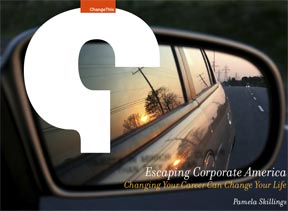 Escaping Corporate America Escaping Corporate AmericaChanging Your Career Can Change Your Life By Pamela SkillingsIf you're like most Americans, you're going to spend more than 100,000 hours at work over the course of your lifetime. That’s probably more time than you'll spend with your best friend, the love of your life, or your cherished offspring. So, wouldn't it be a shame to waste the majority of those hours on work that annoys you or, even worse, makes you downright miserable?This Is Not My Beautiful LifeOver the years, I've talked to a lot of disgruntled corporate employees. I worked in the corporate trenches myself for more than a decade and spent several more years interviewing and coaching corporate escapees. I've learned that people tend to stay stuck in jobs that don't inspire them for one of five common reasons (and sometimes it's a combination of a few). Do any of these scenarios ring a bell for you? You believe that it isn't possible to actually love your work.Some of us have been taught, by conservative parents or disapproving guidance counselors, that jobs are strictly ways to earn money. You're not supposed to enjoy your time in the salt mines, really. As a result, you may have ended up in a career that looked good on paper, but offers little fulfillment. You're not sure what you want to do with your life.For many of us, our careers just sort of happened. We took a "temporary" gig until we could figure out what we wanted to do for our "real" careers. Then, we woke up years later to realize that we were stuck in careers and lives that we never planned or wanted. You're having a mid-career crisis.Maybe you once loved your career, but the thrill is gone. You've stopped learning and growing, lost interest in your current field, or are otherwise ready to move on. But you're afraid to take a chance on something new--or you're confused about which direction to take from here. You're too busy working to make time for a career change.If one of your complaints is that your job is overly demanding, it can be difficult to carve out enough time to eat and sleep, let alone start working toward a new career. Instead, it can be tempting to put off change until some imagined day when you will magically have plenty of time. It's all about the money.There is no shame in caring about money. We all need money to live--some more than others. It isn't shallow to enjoy what money can buy. We all have different priorities and different ideas of what makes life good. You may value a high salary because it gives you the ability to put your kids through college, support your favorite charities, or just take nice vacations and see the world. The problem comes when you trade too much for a high salary. There are ways to make money that don't require selling your soul.
Did any of these ring a bell? Download the solutions and the full ebook here. -------------- Mini Sagas: Bite Sized Lessons For Life and BusinessBy Rajesh Setty I love this! Both visual and inspirational. Each story is comprised of 50 words with a picture. I love the tight word limit. What a great exercise! We should do our own mini-sagas sometime. In this photographic manifesto (the first in ChangeThis history) Rajesh Setty has compiled 15 mini sagas from his collection. Each 50 word story is packed with a lesson on life and/or business. 
#13 The Missing PieceI was at a writers' conference earlier this week. The moderator asked for people to list their expectations from the conference. The expectations ranged from wanting to sell more books to building a good network. What was strikingly missing was that nobody said "I want to become a better writer." 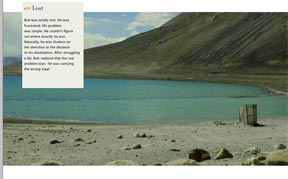 #10 Lost #10 LostBob was totally lost. He was frustrated. His problem was simple. He couldn't figure out where exactly he was. Naturally, he was clueless on the direction or the distance of his destination. After struggling a bit, Bog realized what the real problem was--he was carrying the wrong map!  #2 The Book #2 The BookJohn loved the library. That day, he was engrossed in a book. He hoped to finish reading it completely. It was almost the end, and then...there was a surprise--the last section was missing. Alas, John thought, this book is close to real life. You don't know what happens next... Okay, while you can tell the guy that wrote this book isn't exactly a writer, I love the concept, and the design. A photo-journal, or "mini-saga," as he calls it. Super idea. I'd love to see more of this! Click to download the full ebook manifesto here. -------------- 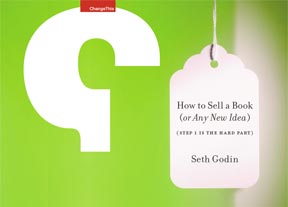 How to Sell a Book (or Any New Idea) How to Sell a Book (or Any New Idea)(STEP 1 IS THE HARD PART) By Seth Godin My friend Fred has a new book coming out and he was trolling around for new marketing ideas. I think he’d be surprised at this: Sell one. Find one person who trusts you and sell him a copy. Does he love it? Is he excited about it? Excited enough to tell ten friends because it helps them, not because it helps you? Tribes grow when people recruit other people. That’s how ideas spread as well. They don’t do it for you, of course. They do it for each other. Leadership is the art of giving people a platform for spreading ideas that work. If Fred’s book spreads, then he’s off to a great start. If it doesn’t, he needs a new book. You don’t get to take step 2 if you can’t do step 1.
Click here to download Seth Godin's latest manifesto.
-------------- These are just a sample of some of my picks. I haven't had time to read them all--there's quite a lot! If you are an author and want to submit a proposal, follow this link: https://changethis.com/submit. If you just want to see what's available for download, go to: https://www.changethis.comWhat a fun find! Labels: 50 word stories, changethis, ebook, escaping corporate america, free ebooks, how to sell a book, manifesto, mini-sagas, seth godin
Editing: When is Too Much Too Much?
 Have you ever written something so passionate, full of voice, fury, and fire, only to have it edited to shreds? Or to complete boredom? I read a post on Seth Godin's blog, Sucking Out All the Juice, where that very thing happened to him---and I've heard it before. Here's the beginning of Seth's post:"Just got some work back from a new copyeditor hired by my publisher. She did a flawless job. She also wrecked my work. Totally wrecked it. By sanding off every edge, removing every idiom, making each and every fact literally correct, she made it boring and dry and mechanical. If they have licenses for copyeditors, she should have hers revoked." Ouch! Seth sure speaks his mind. But he's a bestselling author and an idea genius. His out-of-the-box thinking is what people love about him, and the reason why they buy his books and read his blog. So, when is too much too much? Well, the first thing is to understand what a copyeditor does. In a nutshell, the copyeditor's job is to hit the Five C's: to make the copy clear, correct, concise, comprehensible, and consistent. Typically, copyediting involves correct spelling, terminology, punctuation, and grammatical and semantic errors; ensuring that the typescript adheres to the publisher's house style; and adding standardized headers, footers, headlines, etc. That is a specific description that can be unspecific, depending on the copyeditor's taste and style guide. Most book and magazine editors use the Chicago Manual of Style--an industry (and a WOW !) standard. But what if your voice is so distinct that a standard guide can't do it justice? That's where the gray area starts, and your doubts about your writing style begin... Seth Godin continues, "I need to be really clear. She's not at fault. She did exactly what she was supposed to do. The fault lies in the job description, not the job. If the job description of your lawyer or boss or editor or client is to make sure everything is pure and perfect and proven and beyond reproach, they are making things worse, not better. (Unless you're in the vaccine business)." Pure, perfect, proven, and beyond reproach isn't what makes for an epic novel, but it surely makes for comprehensive reading. But who's the judge? Many of the classic masterpieces that have molded our literary language today have been less than perfect. Some "fictional" classics were beautifully flawed and ahead of their time, containing innovative language or ideas---ideas that shaped our society, influenced change, and revolutionized generations.
But what if you're writing a nonfiction book? Well, the boundaries are going to be a lot more strict, no matter how you look at it. Even if it is "creative" nonfiction. You could call this a case of uncreative editors, or you could break it down to an editorial standard, but how do we draw the line? Honestly, I don't know. Seth's post continues: "Almost everything you do has some sort of copyediting filter. It might be the legal eagle or the graphic supervisor or the customer service police. They're excellent at making round things fit perfectly through round holes. Boring and ignored is fine with them, because no one complains. Fortunately, copy editors have a remedy. It's a word called STET. Which means, "leave it alone, it was fine." Time to teach that to your editors, wherever they may be. Maybe there should be a t-shirt. If all you want is safe, have baby food for dinner. Just leave me out of it." So, what I want to know is:* Have you ever been edited too much?(To the point you think it squashes all the Oomph out of your voice?) Labels: book editing, copyediting too much, over editing, Publishing, seth godin, sucking out all the juice, writer's voice
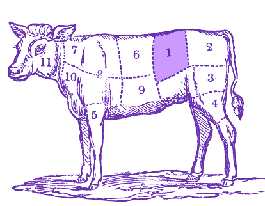 What is a purple cow and how do we find one? Seth Godin writes: What is a purple cow and how do we find one? Seth Godin writes:When my family and I were driving through France a few years ago, we were enchanted by the hundreds of storybook cows grazing on picturesque pastures right next to the highway. For dozens of kilometers, we all gazed out the window, marveling about how beautiful everything was. Then, within twenty minutes, we started ignoring the cows. The new cows were just like the old cows, and what once was amazing was now common. Worse than common. It was boring. Cows, after you’ve seen them for a while, are boring. They may be perfect cows, attractive cows, cows with great personalities, cows lit by beautiful light, but they’re still boring. A Purple Cow, though. Now that would be interesting. (For a while.)
-- excerpt from Purple Cow: Transform Your Business by Being Remarkable by Seth GodinSeth was talking about marketing your business or product, but I found his words incredibly wise, or “sage” (as Sue likes to say, ;-) ). If you see something too often, it’s not going to appeal to you. Your eyes will glaze over and you’re on to the next thing. This is particularly true in this day and age. But it wasn’t before. Think of writing, and what we all call “the classics”. Those were amazing pieces weren’t they? Perhaps. But why? Maybe because they were the first ones to unleash those concepts or ideas on the world. The same thing can be said with art. Every artist has heard the saying, “It’s all been done.” As time goes by and we advance in technology, a scary thought is that someday everything will be done. What would happen then? A hive-like mentality? All for the greater good? No means of expression? I shudder to think about that future. Seth was talking about how the old advertising standards simply don’t apply anymore, but the quest for the purple cow can be anything. It can even apply to your blog or your writing. As I let this concept sink in, I thought about our quarterly flash fiction contests. If you’ve never been on the opposite end of a prompt-based contest (most people haven’t—even editors in the industry for years!) then you’d find out something extremely curious: people write about the same things.I would say that our prompts are fairly loose, and give room for interpretation, but you’d be surprised at the outcome. Writers choose the same plot twists, the same surprise guest, and even the same characters! 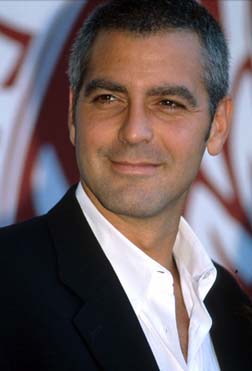 For instance, take our Fall, Winter, and Spring contests—the ones where I was actively judging—did you know that in those contests George Clooney was a bigamist? It’s the weirdest thing, but that quote came from one of our guest judges, who blindly judged entries. I laughed when she wrote that to me in an email, but the thought had already occurred to me. Believe me, there's absolutely nothing wrong with that at all, I just think it's strange how many wrote about the same celebrity! Each contest we’d have more than five women feature George Clooney in their story. He’s a hunk for sure, but oddly enough, there were no other mentions of celebrities, except for maybe one Brad Pitt reference, but no main characters of other celebrities were incorporated. Now, I haven’t a clue what this means, and the stories were completely different... but it still seems odd! Are we all interconnected in some way? Like when you think of a friend and then later on that day the phone rings? Or is it much greater? Are we moving closer to that ‘hive-like mentality’ that completely petrifies the artist in me? Besides simply mentioning Mr. Clooney (just an odd coincidence), there were many other similarities in story: same structure, same ailments, similar dialogue, beginnings, endings. Of course, our guest judges did a fabulous job of picking the winners, and the variety of stories were great, but did those elements play a hand in their decision? I honestly don't know. Perhaps on a more universal level, we’re getting to the point where everything in fiction has been done before. Where story arcs have come down to a few set methods and we have to choose one of those if we want to sell a book. Whatever it is, let’s make a pact to keep striving for that purple cow. But how do we do that? This is what I truly believe:- We are all like snowflakes, each one of us is unique.
- There is no single person out there on the planet that can tell your story the way you can.
- No one else has experienced your true-life stories.
- You have something special to tell the world.
- You have your perspective.
- Your personal story is, in essence, your purple cow.
Now, I want to know:-- Do you think there are only a few set story arcs to fiction? And does this bother you? -- How do you feel about sharing your true-life experiences? What are your reservations? -- Have you ever found your purple cow? Labels: essay writing, everything has been done before, george clooney, plot, purple cow, seth godin, story arc, writing true life stories
|
 If you haven't heard of ChangeThis, you should definitely check it out. It's great on so many levels. If you are an author looking to promote your book, you should consider submitting a proposal for a manifesto to buzz your book. If you are someone like me, who simply enjoys free ebooks, then you'll delight in the variety of topics the ChangeThis e-books provide. They're not your typical run of the mill stuff. Yes, they are fairly short, about 5-18 pages, but they are chockfull of information/arguments presented in a gorgeous package. The designers are awesome! I can see why they get a lot of proposals.
If you haven't heard of ChangeThis, you should definitely check it out. It's great on so many levels. If you are an author looking to promote your book, you should consider submitting a proposal for a manifesto to buzz your book. If you are someone like me, who simply enjoys free ebooks, then you'll delight in the variety of topics the ChangeThis e-books provide. They're not your typical run of the mill stuff. Yes, they are fairly short, about 5-18 pages, but they are chockfull of information/arguments presented in a gorgeous package. The designers are awesome! I can see why they get a lot of proposals. Escaping Corporate America
Escaping Corporate America


 How to Sell a Book (or Any New Idea)
How to Sell a Book (or Any New Idea)













